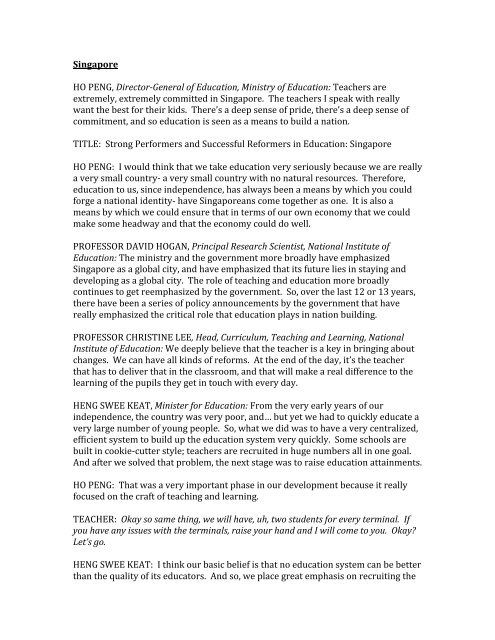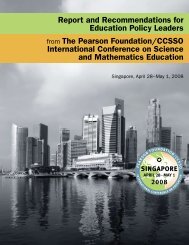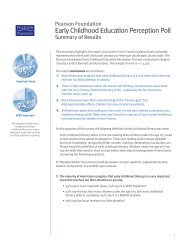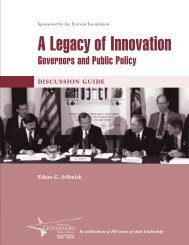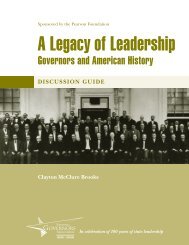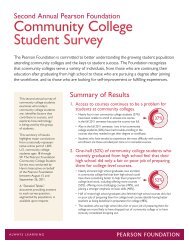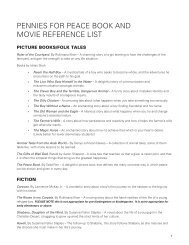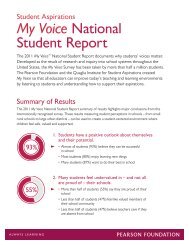Transcript English - Pearson Foundation
Transcript English - Pearson Foundation
Transcript English - Pearson Foundation
Create successful ePaper yourself
Turn your PDF publications into a flip-book with our unique Google optimized e-Paper software.
Singapore <br />
HO PENG, Director-‐General of Education, Ministry of Education: Teachers are <br />
extremely, extremely committed in Singapore. The teachers I speak with really <br />
want the best for their kids. There’s a deep sense of pride, there’s a deep sense of <br />
commitment, and so education is seen as a means to build a nation. <br />
TITLE: Strong Performers and Successful Reformers in Education: Singapore <br />
HO PENG: I would think that we take education very seriously because we are really <br />
a very small country-‐ a very small country with no natural resources. Therefore, <br />
education to us, since independence, has always been a means by which you could <br />
forge a national identity-‐ have Singaporeans come together as one. It is also a <br />
means by which we could ensure that in terms of our own economy that we could <br />
make some headway and that the economy could do well. <br />
PROFESSOR DAVID HOGAN, Principal Research Scientist, National Institute of <br />
Education: The ministry and the government more broadly have emphasized <br />
Singapore as a global city, and have emphasized that its future lies in staying and <br />
developing as a global city. The role of teaching and education more broadly <br />
continues to get reemphasized by the government. So, over the last 12 or 13 years, <br />
there have been a series of policy announcements by the government that have <br />
really emphasized the critical role that education plays in nation building. <br />
PROFESSOR CHRISTINE LEE, Head, Curriculum, Teaching and Learning, National <br />
Institute of Education: We deeply believe that the teacher is a key in bringing about <br />
changes. We can have all kinds of reforms. At the end of the day, it’s the teacher <br />
that has to deliver that in the classroom, and that will make a real difference to the <br />
learning of the pupils they get in touch with every day. <br />
HENG SWEE KEAT, Minister for Education: From the very early years of our <br />
independence, the country was very poor, and… but yet we had to quickly educate a <br />
very large number of young people. So, what we did was to have a very centralized, <br />
efficient system to build up the education system very quickly. Some schools are <br />
built in cookie-‐cutter style; teachers are recruited in huge numbers all in one goal. <br />
And after we solved that problem, the next stage was to raise education attainments. <br />
HO PENG: That was a very important phase in our development because it really <br />
focused on the craft of teaching and learning. <br />
TEACHER: Okay so same thing, we will have, uh, two students for every terminal. If <br />
you have any issues with the terminals, raise your hand and I will come to you. Okay? <br />
Let’s go. <br />
HENG SWEE KEAT: I think our basic belief is that no education system can be better <br />
than the quality of its educators. And so, we place great emphasis on recruiting the
ight teachers. We start with fairly academic standards that our teachers are <br />
recruited from the top 1/3 of every core of students. And from that top 1/3, they go <br />
through a series of tests and interviews to ensure that we recruit teachers who are <br />
passionate about teaching, who cares about students. Then they go through <br />
rigorous training at the National Institute of Education. <br />
TEXT SLIDE: The National Institute of Education (NIE) is Singapore’s national <br />
teacher training institute. The Ministry of Education recruits prospective teachers <br />
and sends them to the NIE for training. Once they have complete their course, they <br />
are deployed in schools where they get further support from experience teachers as <br />
mentors. <br />
PROFESSOR TAN OON SENG, Dean of Teacher Education, National Institute of <br />
Education: Let me describe the philosophy behind our curriculum. First of all, we <br />
prepare a teacher to be first a teacher of the learner, number one. And number two, <br />
to be a good teacher of the subject. So, the essential foundation is that a good <br />
teacher must, first of all, be very passionate and clear about how to help people <br />
learn, and how people learn best. <br />
TEACHER: Okay, the challenge for the ??, say ten minutes, is this: if you had to do a <br />
made in Singapore movie, about an inspirational Singapore teacher movie, set in say, a <br />
neighborhood school, what would this teacher look like and how would you film it. <br />
Okay? I’ve got markers here… <br />
PROFESSOR LEE SING KONG, Director, National Institute of Education: We have few <br />
rules to fulfill in this whole education system. And at first we prepare. All the new <br />
teachers that our education system meets annually, and on an annual basis we <br />
graduate some 2,000 new teachers for the school system. And secondly, we have <br />
31,000 teachers in the education system, and our policy makers rightly identify that <br />
the professional development of the 31,000 teachers in the school is as equally <br />
important as that of preparing new teachers. <br />
TEACHER: What are the key factors in this test? I think that if you ask a question this <br />
way that the students will just plop the answers on the paper. So how can we put this <br />
question into a Socratic questioning and which type of Socratic questioning would you <br />
use? <br />
HO PENG: I think we are a deep believer of lifelong learning. At the pre-‐service <br />
level, we cannot teach our beginning teachers everything-‐ what it means to be a <br />
good teacher. We have to encourage our beginning teachers to come by and be <br />
involved with continual learning and in-‐service courses, and there’s plenty of <br />
professional development opportunities for them, and I think that access and the <br />
support is, I think, an envy of many countries. <br />
PROFESSOR LEE SING KONG: That is quite a systematic approach towards <br />
developing teachers who are already in the schools. In fact, the ministry supports
this professional development of teachers, and recognizes its importance by <br />
allowing every teacher to have an entitlement of 100 hours of professional <br />
development time to help her or him to become a better teacher. <br />
TEXT SLIDE: In 2009, the Ministry of Education introduced the concept of <br />
Professional Learning Communities, or PLC, to Singapore’s schools. PLCs provide a <br />
forum where teachers share and learn from each other with the specific intent of <br />
enhancing student learning. <br />
TEXT SLIDE: To date, 271 schools have created PLCs. Thanks to continuous <br />
dialogue and feedback, teachers improve their classroom skills and stay up to date <br />
with professional practice. <br />
TEACHER: Today we are looking at how we can enter the scaffold student learning <br />
through the use of Socratic questions and we’re going to look at picture discussion, <br />
okay? Um, maybe before we even look at the questions, what do you think are some of <br />
the concerns of learning outcomes that you want to see in your students, what are the <br />
problems you face? <br />
ADRIAN LIM, Principal, Ngee Ann Secondary School: We believe very strongly that <br />
we must have a professional learning community. You know, that’s “PLC” and right <br />
in the middle of this three-‐letter word, “L”, “learning.” So, teachers must learn, and I <br />
think with the kind of knowledge economy that has emerged, you have new <br />
knowledge created every day. And I think the teachers must keep up with the <br />
content, and also development in new pedagogy. So, if the teachers do not keep on <br />
learning, they will find that it is going to be very difficult to engage the kids of today, <br />
who are exposed to a lot of information via the internet and social media. The day <br />
they stop learning is the day where they will not be able to engage their kids <br />
effectively. <br />
STUDENT TEACHER: I think it would be best to ask questions to allow them to probe <br />
deeper into the picture… <br />
TEACHER: Are you suggesting that we look at observation… <br />
STUDENT TEACHER: Interpretation, influences… yeah… <br />
ADRIAN LIM: To do that, really, we get teachers to work together, to collaborate, <br />
and to look at each other’s practice in the classroom. I think it is essential and really <br />
very critical, because the good teaching practices should not reside within the four <br />
walls and be kept to one teacher, and I think there is a lot of sharing that we can <br />
have in this school. <br />
TEACHER: What you want to do right now is, okay, think of the Socratic questions, <br />
what do I want to use to further the find, clarified. Now, okay, I will go on the internet, <br />
I will find any form of evidence that will help support this statement
MUNEIRA DAUD, Head of <strong>English</strong> Language and Literature Dept., Ngee Ann <br />
Secondary School: Professional Learning Community in schools was started <br />
basically to ensure that teachers had a platform to develop their teaching practices. <br />
Our main focus, actually, is to make sure that students learn best, and in order to do <br />
that we have to collaborate. We exchange ideas; we… we try out, we tests. And <br />
eventually we check for results. And the intention, really, is to share ideas, to make <br />
it better for the students. <br />
TEXT SLIDE: Ngee Ann Secondary School is a Future School. These schools <br />
encourage innovation and enterprise in teaching practice, and flexible learning <br />
environments with a special emphasis on the use of technology and digital media. <br />
PLC TEACHER: We are in the process of watching a model lesson that’s being run by <br />
my colleague here, and the whole process of us watching the lesson is to gain some <br />
kind of points from her lesson, and also to provide our feedback. We discuss it to <br />
come up with a better lesson because definitely learning goes with sharing and <br />
communication, and there’s definitely in scope for improvement for any lesson. <br />
TEACHER: What do you understand National Service to be, when you think about it, <br />
what comes to mind? (STUDENT RESPONDS) <br />
MUNEIRA DAUD: There’s always something new to learn. You’re never at a <br />
standstill. You’re always moving ahead, pushing boundaries, trying to discover new <br />
things, new ways of teaching. So, it’s exciting because you don’t get caught in a rut. <br />
Even if a pedagogy is sound, there’s always a technology that’s always challenging <br />
us, and we always have to find new ways to connect with the kids and to challenge <br />
them. <br />
TEACHER: This is the question, philosophy defines the rate of change of the sense of <br />
time, is it true? So I want you to tweet me answers, this is how you tweet, this is the <br />
format you need to tweet. So you put “at sign vote by tweet 1”. <br />
PROFESSOR LEE SING KONG: In the early 1990s, the teachers really are the <br />
monopoly of knowledge, and they are the one that comes to class to deliver that <br />
knowledge so that the students can acquire them. But today, knowledge is no more <br />
a monopoly among the teachers, because students can get knowledge from a myriad <br />
of sources, and hence the role of the teacher today… yes, there is still a component <br />
of knowledge imparting, but there is also a very large component of facilitation, that <br />
may facilitate students where they could get the right knowledge, how they could <br />
synthesize things, how they could discern the information that they get. <br />
TEACHER: Energy cannot be created or destroyed, okay what principle is this? <br />
Principal of conservation of energy, ok good.
ADRIAN LIM: So, we look at technology very meaningfully, and we see how can we <br />
leverage this technology to make a very significant impact in the classroom <br />
instruction? I’ll give you an example. In a classroom of 40, it is really impossible to <br />
get 40 students to ask 40 questions at one goal. When we use the instant messaging <br />
tool, we open 40 windows to 40 kids. They could ask 40 questions at the same time, <br />
and the teacher could see they are thinking on the technology tool that they use, and <br />
the kids get more excited because they are using the tools that they are very, very <br />
good in using, not just a pen and a pencil. <br />
TEACHER: Everything consolidated on one PowerPoint slide. Use the main thing as a <br />
skeleton, then you add on to the different parts. Okay? <br />
ADRIAN LIM: A lot of our younger teachers are coming in. They’re a lot more savvy <br />
in the use of information, communication, technology tools. And I see them teaching <br />
the more senior teachers how to use those tools effectively. <br />
ASHIKIN ABU, Biology Teacher, Ngee Ann Secondary School: I think this is what you <br />
want to encourage, in a class you want to encourage a student to think for themselves. <br />
Yeah, correct? If you do not know the answer, it’s okay… <br />
CAROLYN KHOO, Biology and Chemistry Teacher, Ngee Ann Secondary School: Yeah <br />
it’s okay, I’ll just be honest: we are here to learn together. <br />
ASHIKIN ABU: Correct. So I really think this research that you have done, really <br />
prepare yourself better in the classroom… <br />
ADRIAN LIM: Within a department, we also assign mentors to teachers. So, new <br />
teachers come in. They are not left alone. They will be mentored by very <br />
experienced teachers who have taught for more than at least five years. It’s sort of <br />
like an apprentice kind of relationship where a more senior teacher guides a young <br />
teacher in the profession. <br />
CAROLYN KHOO: Give them the different categories to work on, the number of petals, <br />
the type of roots. If you guide them with categories, they are able to differentiate into <br />
the two types of species of monocotileden and dicotiledens. <br />
CAROLYN KHOO: I think there are many benefits of the mentoring program. Firstly <br />
is the relationship I have built with my mentor. In terms of teaching pedagogues, <br />
what I used to do would be, I… I just teach. I just go through the content and just <br />
make sure… chuck it on the students and make sure, “This is the content; you <br />
receive it.” But after different sessions with my mentor, Madame Ashikin, I actually <br />
learned that it is important to question, and not just question-‐ you have to wait for… <br />
give time for answering. <br />
MENTOR TEACHER: Yeah, so I think this is really well done. Perhaps, I just wanted to <br />
suggest to you…
ASHIKIN ABU: I believe that her learning, my learning, begin with questioning each <br />
other… each other’s approaches; why do we do this and that? And I think from <br />
there, if we are earnest enough to listen, to give time to one another, that is where <br />
we both benefit. I truly feel that way. <br />
TEACHER: Can you hear us clearly? <br />
TEACHERS ON SCREEN: Yes. Can you hear us alright? <br />
GROUP OF TEACHERS: Yes, alright. Okay first of all, I understand that the purpose of <br />
this Skype session, we want to confer the suitability of the pretest. This common <br />
agenda that we have… <br />
TEACHERS ON SCREEN: Yes, common agenda. Yeah, that’s right. <br />
ADRIAN LIM: I would say that the teachers in this school, myself included, we… we <br />
scan the globe for best practices. <br />
TEACHERS ON SCREEN: One thing we can maybe think about is if we give it to the <br />
children, some of them might actually come up with the idea of the steepness of the <br />
slope. They might actually be able to start accessing the understanding of different <br />
gradings and change. <br />
ADRIAN LIM: In fact, I would say that the teachers here are very curious, and they <br />
are always on the lookout for what is the best way to deliver that content to the <br />
students. <br />
PROFESSOR TAN OON SENG: Teaching is not a job. You are here for a calling. And <br />
because it is a calling, it can only be fulfilled if you have a passion for it. <br />
TEXT SLIDE: When Singapore attainted statehood in 1965, most of its two million <br />
people were illiterate and unskilled. The government moved fast to raise education <br />
standards. By the early 1970s all children had access to lower secondary education. <br />
TEXT SLIDE: In 2009, Singapore participated for the first time in PISA. Its students <br />
scored an average 526 points in reading, putting Singapore in the top eight <br />
performers. <br />
TEXT SLIDE: In math, they scored an average 562 points, surpassed only by <br />
students in Shanghai, China. And in science, they scored 542 points, putting <br />
Singapore in the top four. <br />
PROFESSOR DAVID HOGAN: If you look at the status rankings of teachers in <br />
Singapore, they are accorded enormous social status by the community at large. So,
they are right up there with doctors, lawyers, judges. ‘Cause essentially, teaching is <br />
a really important professional role that they play in the community. <br />
HO PENG: We meet with schools and teachers very often. Every director here… In <br />
fact, we visit school at least 12 times a year. And so, I went to school just yesterday. <br />
And you actually hear the teachers… you hear the teachers and you know really that <br />
what are some of the issues on the ground, what are some of the ground concerns, <br />
what do we need to do to support them better? Teachers are your most precious <br />
resource, and so I think developing teachers is one of the things that we pay a great <br />
deal of attention to, and that’s what I look forward to.


